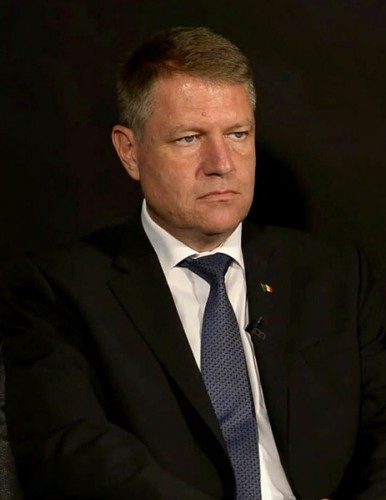ROMANIA. German ethnic Klaus Iohannis won the second round of Romania’s presidential election held on November 16, 2014. Iohhanis, the mayor of Sibiu, which is one of Romania’s largest cities, has scored an unexpected final victory with 54,50% of the votes over Prime Minister Victor Ponta with 45,49%. This is after the first round of presidential elections on November 2, 2014, placed Ponta ahead of Iohannis with more than 10%.
The coalition Ponta’s Cabinet is currently supported by holds the majority in both chambers of the Romanian Parliament. Iohannis is the leader of minority liberal center-right party. During his electoral campaign, Klaus Iohannis promised a crackdown on corruption, to safeguard the independence of Romania’s judicial system, and to support Romania’s Diaspora.
Overseas voters played a key role in the victory of centre-right candidate Iohannis, who underlined the poor organization of the vote abroad in the first round by Ponta’s Government. Thousands of Romanian citizens weren’t able to vote because of a limited number of polling stations in several countries and have protested outside embassies in Paris, Munich and London.
The resignation of Foreign Minister Titus Corlatean on November 10, 2014, who explained three days earlier that, “The number of polling stations is for the Electoral Bureau to decide, as it has always been, and not for the Ministry of Foreign Affairs. However, what we can do, in terms of logistics, is to increase the number of booths and stamps in each station.” yet hasn’t solved the lack of new voting centers.
New Foreign Affairs Minister Teodor Melescanu asked the Central Electoral Bureau on November 11, 2014, to clarify the legal basis for the opening of additional polling stations. The Electoral Bureau has responded that legal conditions have been met, passing on the fault to the Ministry of Foreign Affairs. During a press conference on November 14, 2014, Melescanu said that the institution hasn’t clarified whether additional polling stations could legally be set abroad. In reference to extending voting hours, Melescanu remarked that “I spoke with whom I had to, namely I sent the proposal to the Central Electoral Bureau, which rejected this proposal.” Melescanu subsequently stepped down as Minister of Foreign Affairs on November 18, 2014, a week after Corlatean.
Thus, hundreds of Romanians could not cast their vote in the second round and those who could not come earlier, were turned away when polling stations closed at 9.00 p.m. Police dispersed the angry citizens in Paris, London and Turin, firing tear gas. In total, almost 380,000 Romanians voted abroad, more than double the turnout in the first round of presidential elections.
Solidarity protests with voters abroad took place throughout the country. Ponta admitted his defeat, and a few hours after the first preliminary results told reporters that, “The people are always right. I called Mr. Iohannis and congratulated him on the victory.” Victor Ponta said he won’t resign from his position as head of Romania’s government. “I became Prime Minister supported by people, by political forces, and if at one point, now is not the case, next year, in two years, those political forces that have supported me request I will not hesitate to take a step back,” explained the centre-left Prime Minister for a national TV outlet later that evening. Ponta stated that, under his political regime, Romania has reported an economic growth of 2,8% within the first nine months of the year, as official data by the National Institute of Statistics showed on November 14 , 2014. In 2013, Romania’s growth rate was 3,5%, according to Eurostat.
European leaders have reacted to the results of presidential election. The President of the European Council Herman Van Rompuy congratulated Iohannis on behalf of the European Union on November 17, 2014. German Chancellor Angela Merkel similarly congratulated Iohannis on November 18, 2014, for his victory and showed full support, affirming that, “I am convinced that together we can deepen our relationship even further.”
The handover of power is scheduled to take place on December 21, 2014, when Traian Basescu ends his term and Iohannis will be sworn in as president.
That is, if all goes well.
Iohannis, found incompatible by National Integrity Agency on April 24, 2013, waits for a court decision set to convene on November 25, 2014, on whether he violated the compatibility standards of public office as mayor of Sibiu and the chairman of the municipal corporation for water supply. If Iohannis receives an incompatibility ruling before taking office, he will not be allowed to hold any public office for the next three years, and new elections will be held, probably, in the spring of 2015. In case the Supreme Court’s decision against Iohannis comes after December 21, 2014, it takes legal effects after ending his 5 years term as President of Romania.
Klaus Werner Iohannis, 55 years old, is a former high-school physics teacher and a school inspector, before starting a political career, as leader of the Democratic Forum of Germans in Romania from 2002 to 2013. He is a member of the Evangelical Lutheran Church of the Augsburg Confession in Romania. Iohannis was elected on November 16, 2014, the fifth President of Romania since the 1989 breakdown of the communist regime. Klaus Iohannis is married to Carmen Iohannis, an English teacher at the “Gheorghe Lazar” National College in Sibiu. They have no children. Iohannis owns three houses and three apartments in Sibiu, which he bought together with his wife in the last 20 years. He also has about 40,000 Euros in banks accounts. Last year, he made almost 10,000 Euros from his salary as mayor of Sibiu and more than 51,000 Euros from renting his houses, according to his public declaration of assets from Central Electoral Bureau.

